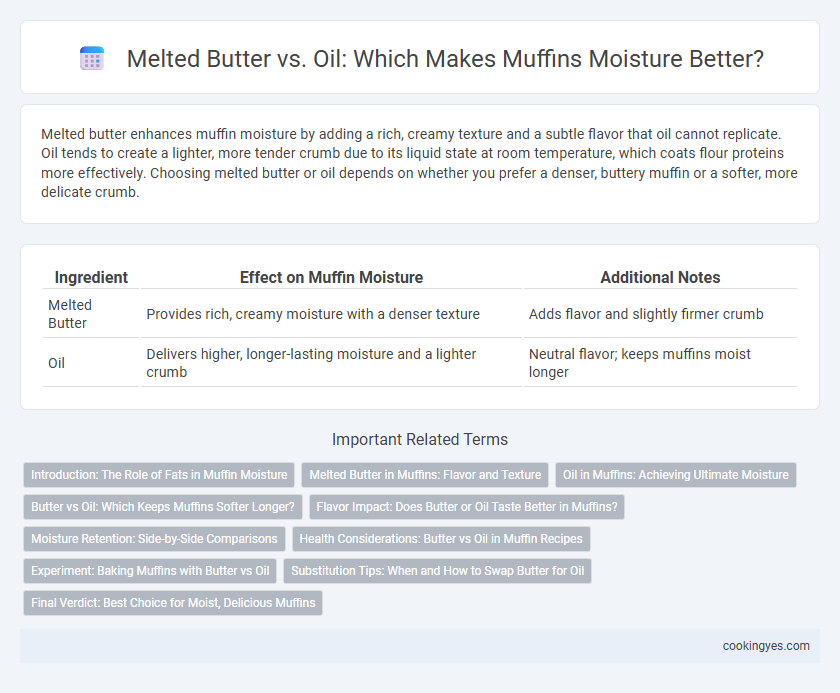Melted butter enhances muffin moisture by adding a rich, creamy texture and a subtle flavor that oil cannot replicate. Oil tends to create a lighter, more tender crumb due to its liquid state at room temperature, which coats flour proteins more effectively. Choosing melted butter or oil depends on whether you prefer a denser, buttery muffin or a softer, more delicate crumb.
Table of Comparison
| Ingredient | Effect on Muffin Moisture | Additional Notes |
|---|---|---|
| Melted Butter | Provides rich, creamy moisture with a denser texture | Adds flavor and slightly firmer crumb |
| Oil | Delivers higher, longer-lasting moisture and a lighter crumb | Neutral flavor; keeps muffins moist longer |
Introduction: The Role of Fats in Muffin Moisture
Melted butter and oil play crucial roles in muffin moisture by influencing texture and flavor retention during baking. Butter contains water and milk solids that contribute to a tender crumb and rich taste, while oil remains liquid at room temperature, providing consistent moisture and softness. Choosing between melted butter and oil affects muffin shelf life and mouthfeel, making fat type a key factor in achieving the desired moistness.
Melted Butter in Muffins: Flavor and Texture
Melted butter in muffins enhances flavor by providing a rich, creamy taste that oil cannot replicate, contributing to a more indulgent eating experience. It creates a tender crumb with a slightly denser texture, which helps retain moisture effectively throughout baking. The butter's milk solids caramelize during baking, adding subtle depth and golden color to the finished muffin.
Oil in Muffins: Achieving Ultimate Moisture
Using oil in muffins enhances moisture retention by coating flour proteins more effectively than melted butter, resulting in a tender crumb. Oil's liquid consistency at room temperature prevents the muffins from drying out, maintaining a soft, moist texture after baking. Popular oils for muffin recipes include vegetable oil, canola oil, and olive oil, each contributing to a rich, moist muffin without altering the flavor significantly.
Butter vs Oil: Which Keeps Muffins Softer Longer?
Melted butter imparts a rich flavor and tender crumb but tends to firm up as it cools, which can make muffins slightly less soft over time. Oil retains moisture better due to its liquid state at room temperature, helping muffins stay softer and more moist for longer periods. Choosing oil over melted butter is preferred when the goal is maximum lasting softness in muffins.
Flavor Impact: Does Butter or Oil Taste Better in Muffins?
Melted butter enhances muffin flavor by adding a rich, creamy taste with subtle caramel notes that oil cannot replicate. Oil contributes to moisture and tenderness but lacks the distinctive buttery aroma that elevates the eating experience. Muffins made with butter deliver a more complex, indulgent flavor profile preferred by many bakers and consumers.
Moisture Retention: Side-by-Side Comparisons
Melted butter enhances muffin moisture through its fat content and water composition, which helps create a tender crumb by trapping steam during baking, resulting in a moist interior. Vegetable oil, being 100% fat with no water, contributes to longer-lasting moisture retention by coating flour proteins and preventing gluten overdevelopment, which maintains softness over time. Side-by-side comparisons reveal that muffins baked with melted butter offer richer flavor and immediate moistness, while oil-based muffins excel in maintaining moist texture longer after baking.
Health Considerations: Butter vs Oil in Muffin Recipes
Melted butter in muffins adds rich flavor and contains saturated fats and cholesterol, which may impact heart health if consumed in excess. Oil, often vegetable or canola, provides unsaturated fats that can support cardiovascular health and improve moisture retention in muffins. Choosing oil over butter can reduce saturated fat intake, making muffins a healthier option without sacrificing moistness.
Experiment: Baking Muffins with Butter vs Oil
Experiments comparing melted butter and oil in muffin recipes consistently show that oil yields moister and denser muffins due to its liquid state at room temperature, which retains moisture more effectively. Melted butter imparts a rich flavor and tender crumb but can lead to a slightly drier texture as it solidifies upon cooling. Data from taste tests indicate muffins made with oil maintain softness longer, while butter-based muffins exhibit enhanced flavor profiles preferred by some bakers.
Substitution Tips: When and How to Swap Butter for Oil
Using oil instead of melted butter in muffins enhances moisture retention due to oil's 100% fat composition, which remains liquid at room temperature, preventing dryness. Substitute melted butter with 80% oil by volume to maintain texture while adding richness, and choose neutral oils like canola or vegetable for a subtle flavor. For best results, blend oil directly with wet ingredients and avoid overmixing to ensure a tender, moist crumb.
Final Verdict: Best Choice for Moist, Delicious Muffins
Melted butter imparts a richer flavor and creates a tender crumb, enhancing muffin moisture and taste through its natural milk solids and fats. Oil, being 100% fat, ensures superior moisture retention and a softer texture, especially in vegan or dairy-free muffin recipes. For the best balance of moist, delicious muffins, oil is generally preferred, but melted butter is ideal when flavor complexity is a priority.
Melted butter vs oil for muffin moisture Infographic

 cookingyes.com
cookingyes.com